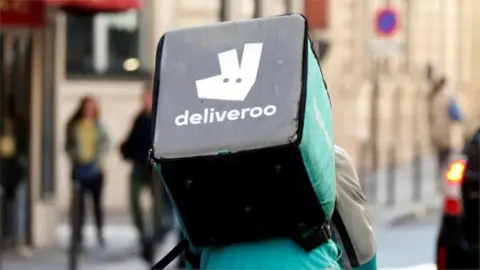'Gig economy' workers 'should get minimum wage'
The former chairman of the Low Pay Commission has said that the minimum wage should be extended to gig economy workers.
Lord Adair Turner argued that the proliferation of "low-wage jobs" needed to be tackled and that some companies were categorising workers as "self-employed" to avoid low-pay protections.
The "gig economy" has become controversial after claims that food delivery companies and courier firms were exploiting employment law loopholes by saying that their workers were "self-employed".
Self-employed people do not receive the minimum wage.
"There is a subset of self-employed people - but not all self-employed - who are doing jobs that are pretty much employee-like," Lord Turner told me.
"And that category appears to have grown, at least in part, probably, because we have imposed a minimum wage on employees.
"It is a regulatory arbitrage, people are moving off to be self-employed or their employers, the people organising their work, are doing it."
Full employees have a legal right to receive at least the minimum wage - also called the National Living Wage - of £7.50 an hour.
Lord Turner, who was chairman of the Low Pay Commission between 2002 and 2006, said it was time to "essentially enforce" the minimum wage "on those categories of the self-employed who, when you really look at them, are essentially employed in the fundamental sense of how their work is organised".
Capitalism 'not delivering'
Lord Turner was speaking after a report by the Resolution Foundation said that the minimum wage should be extended to gig economy workers.
 Reuters
ReutersThe Resolution Foundation report estimated that there are about 1.1 million people now involved in work for firms such as Deliveroo and Uber - technology platforms which connect customers to individual delivery drivers.
"I think there are some bits of the gig economy which probably are only able to survive at the price they are provided to customers because they have essentially managed to find a way of turning what might have been an employee into self-employed," Lord Turner said.
"[That has] two benefits: one, it is not covered by the minimum wage and two, you don't have to play the employer's national insurance."
He argued that "paying a little more for food to be delivered" would be "perfectly reasonable".
Last autumn, the government launched an investigation into the new world of work which has seen self-employment and the gig economy grow.
The review by Matthew Taylor, head of the Royal Society of Arts, is expected to report shortly and will argue that although the UK economy has been good at creating jobs, the quality and pay of those jobs is questionable.
"The UK over the last 10 years has created a lot of jobs, but today, real wages are below where they were in 2007," Lord Turner said.
"That is not the capitalist system delivering its promise that over a decade or so it will raise all boats, and it is a very fundamental issue.
"It includes the gig economy, but it is wider than that. There is something about the economy which left to itself will proliferate very, very low-paid jobs."
Lord Turner said that tax inspectors from Revenue and Customs should be more aggressive investigating firms which were categorising workers as self-employed rather than employed.
